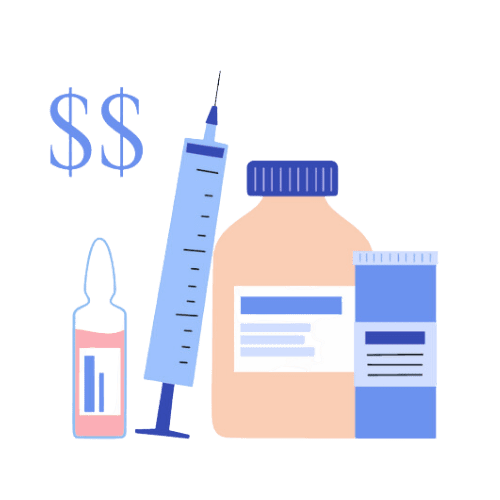Egg Freezing & IVF in Georgia
At Zora Health, you are our top priority. We’re here to guide you through every step of your egg freezing or IVF journey — helping you understand your options, and make confident, informed decisions about your care and costs.
Egg freezing, also known as mature oocyte cryopreservation, is a method used to save women’s ability to get pregnant in the future.
In vitro fertilisation (IVF) is a procedure used to help with fertility, prevent genetic problems and assist with the conception of a child

Spread out the cost of treatment over 12, 24, and 36 months to avoid large upfront payments and reduce financial burden.
LEARN MORE
Accessible & affordable fertility care in Georgia
Egg Freezing and IVF in Georgia
Many fertility clinics in Georgia have several years of experience in egg and sperm freezing, in vitro fertilisation (IVF), intracytoplasmic sperm injection (ICSI), intracytoplasmic morphologic sperm injection (IMSI), assisted hatching (AHA), preimplantation genetic screening (PGS/PGD), testicular sperm aspiration (TESA), egg donors, and surrogacy. Some centres have high success rates of up to 80% in helping women get pregnant while some are recognised by top accrediting institutions in the world such as the European Society of Human Reproduction and Embryology (ESHRE) and the American Society for Reproductive Medicine (ASRM). Many clinics also have international patient assistance departments.
IVF and sex selection are allowed in Georgian fertility clinics for heterosexual couples who are married or in a civil partnership. Egg freezing is permitted for married couples and single women. Egg and sperm donation is permitted for heterosexual couples. The intended parents—not the donor—are legally recognised as the parents. Compensated surrogacy is legal in Georgia.
All About Georgia for Medical Tourists
Georgia's top attraction for medical tourists is its affordability and high quality of treatments, especially in the fields of infertility, cardio surgery, and cosmetic surgery. Patients from the east side of Europe and the west side of Asia prefer Georgia as a medical destination because of the short and inexpensive travel convenience. The success rates for infertility treatments are high, with some clinics reaching up to 80% success rate.
The state universal health program started in 2013. Patients self-fund health expenses at 51% in 2022 through this program. The government is aiming to peg local patients' out-of-pocket expenses to only 30% by 2030. The country has an ample supply of hospital beds and doctors while more nurses are needed to assist doctors in achieving increased productivity.
In 2019, around 25,000 medical tourists from Azerbaijan, Armenia, Russia, Kazakhstan, Chechnya, Ingushetia, Israel, Russia, Belarus, Kazakhstan, Qatar, and Kuwait visited the country for different medical services. Patients exclusively seeking infertility treatments mostly come from China, the U.S., Israel, Sweden, Australia, and India. Many medical tourists seek balneology treatments at the approximately 2,000 mineral springs in different medical wellness resorts in the country.
What To Do in Georgia During Your Medical Vacation
Georgia is filled with numerous breathtaking mountains, caves, beaches, monasteries, and fortresses. The top activity when visiting the country's capital, Tbilisi, is a guided walking tour to explore the old town and immerse in its colourful history. While in Tbilisi, ride the cable car to get to the Narikala Fortress where you can see a majestic view of the city from above. Mtskheta is the religious centre of Georgia. It is home to the old Svetitskhoveli and Jvari churches and Samtavro Monastery. When visiting these churches, wear long skirts and a scarf to cover your head in respect.
Georgia is a safe country to visit. However, it is best to avoid South Ossetia and Abkhazia. They lie on the borders of Russia and are inhabited by Russians. There have been reports of conflict, car bombs, and unexploded landmines in these areas. Political demonstrations and protests take place mostly on Rustaveli Avenue in Tbilisi, the site of the parliament building. Watch out for violence and interruptions in public transportation during these events. Updated weather conditions and reports can be hard to get in Georgia so exercise caution when skiing and hiking up mountains.
Leisure and medical tourists arrive at any of the three major airports. Public transportation is well-developed. It can be challenging though when some signs are in Georgian text with no English translation. The two-line subway is the easiest mode of transportation in Tbilisi because the station stops are written both in English and Georgian. You need to buy a MetroMoney card to ride the metro. You can also use the card to ride buses. Other transportation options are trains, marshrutkas or minibuses, and taxis. Vanilla Sky and Georgian Airways run domestic flights.
The official language is Georgian. It is spoken by about 86% of the population. Other languages spoken are Azerbaijani and Russian. The government has also made it mandatory for English to be taught in schools.
Social Attitudes Towards Fertility Treatments
The Georgian society is very conservative due to influences from the Georgian Orthodox Church. The rights of the LGBTQ+ and modern changes to family are largely challenged. This factor has been cited by analysts as contributing to the growing activism and plans for amendments to legislation governing infertility treatments and services.
Since compensated surrogacy services for foreigners are available in Georgia, an article was written about the government's announcement in 2023 of its plan to ban the country's commercial surrogacy program. The proposed ban is scheduled to take effect in 2024 to protect children and surrogate mothers from human trafficking. It also aims to protect its surrogacy law that prevents same-sex couples from accessing fertility procedures and services including surrogacy. When this plan takes effect, only altruistic surrogacy for Georgian heterosexual couples will be permitted.
Benefits of Doing Fertility Treatments in Georgia
High-quality fertility care treatments in Georgia are affordable and enjoy high success rates. IVF in Georgia is allowed with the foreign couple's written consent to avail of infertility treatment and embryo transfer obtained from the IVF procedure to the surrogate mother's uterus as well as acknowledge the risk of genetic disease transmission. The country allows frozen gametes and embryos to be shipped into and out of Georgia. Frozen embryos or male/female sex cells may be used for IVF to achieve pregnancy.
The intended parents—not the donor—are legally recognised as the parents. To register the birth, Georgian law requires the following documentation: a signed surrogacy agreement, an IVF clinic-issued certificate of embryo transfer to permit the transfer into the surrogate mother's uterus, and a maternity hospital-issued certificate of childbirth.
Private Fertility Clinics in Georgia
Beta Plus Fertility
The services at Beta Plus Fertility include fertility testing, IVF, PGS/PGD, TESA, egg and sperm freezing, egg donors, and surrogacy. The medical team is led by expert doctors with over ten years of experience in advanced technology and treatments. This fertility clinic enjoys the highest success rates in Georgia with 70 – 80%. Its guaranteed IVF and egg donation programs offer unlimited IVF cycles until a woman successfully gets pregnant.
IVF Georgia: Scandinavian Fertility Centre
With a 75% fertility success rate, the services at IVF Georgia include IVF, IUI, surrogacy, egg donors, and PGS/PGD. The fertility clinic is a member of ESHRE and ASRM. The medical team of highly skilled doctors in fertility care trains from abroad and consults with foreign counterparts to provide high-quality services. The centre is located in the basement of the 5th Clinical Hospital in Tbilisi. Established in 2009 and operating for over a decade, its facilities include a laboratory, maternity house, and newborn resuscitation department. The overall cost is affordable at USD 6,000 – 9,000 per IVF cycle.
Chachava Clinic Reproductive Health Center
Opened in 2014, Chachava Clinic offers IVF, ICSI, IMSI, AHA, gestational surrogacy, PGD/PGS, and egg, sperm, and embryo donation with an open policy of showing a patient the pictures of donors to help one choose depending on personal preference. Its laboratory is equipped with advanced technology and the fertility clinic facilities are well-designed for patient comfort and safety. Medical tourists from around the world who are eager to build their families are updated and assisted by the centre's international patient care coordinators.
One of the most popular IVF packages at the clinic is the IVF-ICSI with Surrogacy and Egg Donation Package which starts at GEL 101,250 (USD 37,500). Another one is the Life Changing IVF with Egg Donation Package at the cost of GEL 27,007 (USD 7,410).
Costs to Consider
The average cost of standard IVF in Georgia is GEL 13,130 – 39,400 (USD 5,000 – 15,000).
IVF costs GEL 24,760 (USD 9,430) with donor eggs and GEL 18,460 (USD 7,030) with donor sperm.
The IVF cost with gender selection is GEL 19,460 (USD 15,030).
The cost of IVF with ICSI is GEL 20,628 (USD 7,640).
Other Considerations Before Starting Your Fertility Treatment in Georgia
IVF
IVF is allowed in Georgia for heterosexual couples who are married or in a civil partnership.Sex selection is permitted.
Egg Freezing
Oocyte freezing is permitted for married couples and single women.
Donors
Egg and sperm donation is permitted for heterosexual couples. The intended parents—not the donor—are legally recognised as the parents.
Surrogacy
Compensated surrogacy is legal in Georgia.Surrogacy agreements are legally binding.Why Choose Georgia for Your Fertility Treatment
Customer satisfaction is a priority for Georgia's fertility journey specialists. High-quality fertility care treatments are affordable and enjoy high success rates to help patients realise their dream of building a family. The average cost of standard IVF is between USD 5,000 to 15,000. IVF is allowed with the foreign couple's written consent to avail of infertility treatment. After embryo freezing, the country allows the frozen gametes and embryos to be shipped into and out of Georgia.
After undergoing the IVF treatment with your doctor, ride the cable car to get to the Narikala Fortress where you can see a majestic view of the city from above, visit churches and monasteries, or take a guided walking tour around Tbilisi to unwind.
Ready to do your egg freezing & IVF journey in Georgia?
Meet Our Network of
Experienced Fertility Specialists

You deserve the very best.
That's why we’re here to support you — whenever you need it.
1
Personalised Care Navigation
Expert guidance to choose the right care provider and navigate the process, costs, & regulations.
2
Seamless, All-in-One Care
Consultations, diagnostics, telehealth, education, & treatment referrals are available on one platform.
3
Trusted, Reliable Resources
Gain clarity & confidence with verified information. Save time, reduce stress, & eliminate endless research.
Global reach, unparalleled service

"Clear pricing - clarity & support from start to end."
"I love Zora Health for their simple, transparent pricing. It was a relief not to worry about unexpected fees or hidden costs. They made the entire process stress-free and easy to understand, which allowed my husband and I to focus on what mattered most - my family's future."
Syarifah, 27 & Indra, 29

"I couldn't believe that I can choose my own doctor and enjoy extra benefits for the same price."
"I had a preferred doctor overseas that my girl friends recommended. He is part of Zora’s clinic network, but I was interested in Zora’s support and perks. After speaking to Zora, they assured me I wouldn’t pay extra. Zora managed the whole process - from personalised guidance to answering my queries about legalities."
Nina, 32, Single

"The financing options lifted a huge weight off my shoulders."
"Zora’s instalment plans were a true lifesaver. I was so grateful for their flexible and affordable options. I have been thinking about preserving my eggs as a form of “insurance” but didn’t want to pay a big lump sum upfront as I am saving for a house. The instalment plan helps me manage my finances better.”
Elaine, 32

"I never felt alone in my fertility journey."
"After failing previously, we were very anxious and were not sure what to expect. They guided us through the process and cared for us every step of the way. My treatment at the clinic was long, and sometimes it was emotionally draining, but having a fertility coach made us feel better and more prepared. As busy professionals, we appreciate the convenience of scheduling appointments through Zora. I have recommended Zora to all our friends."










